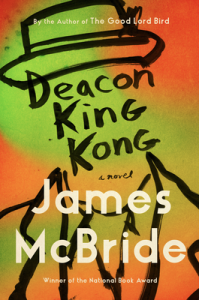The story opens with Sportcoat, a deacon at Five Ends Baptist Church who is perpetually drunk on the local moonshine called King Kong, entering a courtyard at the Cause Houses, a Brooklyn housing project. He takes out a rusty handgun and shoots Deems, a young drug dealer whom Sportcoat used to coach on the project’s baseball team.
Deems gets away with just losing an ear, but all the witnesses are shocked by the genial drunk’s use of violence. They are also concerned about the danger to Sportcoat from the police, Deems himself, or competing gangsters. It is 1969, just before communities such as this—a mix of Baptists, Catholics and criminals; Blacks, Latinx, Irish, and Italian—began to disintegrate due to the loss of idealism after Martin Luther King’s assassination, the changes in city politics, and the influx of crack cocaine.
McBride uses what Jane Alison in Meander, Spiral, Explode calls a spiral structure, which “begins at a point and moves onward . . . spinning around and around that central point or a single axis.”
As we spiral out from the shooting, we get to know many of the people in the community: Sportcoat’s best friend Hot Sausage who gives out the high-quality cheese that appears regularly as if by magic, an Italian gangster known as the Elephant, and Deems himself, once a promising pitcher but lured away by the easy drug money. We meet Potts, a policeman near retirement who’s come back to his early beat in the Cause Houses, a number of strong church ladies, and a quiet Nation of Islam convert named Soup, among many others. It’s a large cast, but everyone is so colorful that it’s easy to remember them.
With humor and compassion, McBride gives us their stories, while always coming back to Sportcoat and the shooting. The deacon claims he doesn’t remember shooting Deems and instead is trying to get him to come back and play baseball. Sportcoat is also in near-constant conversation with his dead wife Hettie, who disapproves of his laziness and drinking, and refuses to reveal where she hid the money collected for the church’s Christmas Fund.
The Christmas Fund is one of a number of other spirals in the story, cropping up repeatedly, as does the question of who is providing the cheese. There’s also a recurring question expressed by various characters as to what exactly a deacon does, and stories about the founding of the church.
A lot of humor is created by the shenanigans the characters get up to, such as Sausage and Sportcoat sharing a single driver’s license on alternating weeks or trying to fix a recalcitrant generator. Even when poking fun at them, McBride sidesteps stereotypes to present each character as a full human being, flawed perhaps, but trying their best to get on.
While some reviewers have considered this story a farce, to me it seemed utterly real. The characters are much like people I have known, and their world—so vividly portrayed—one I am familiar with.
Between the humor and the human drama, the story moves quickly. A common problem for spiral stories is how to end them and, indeed, here the ending seems a rush to tie up the different subplots. Disappointingly, there are some loose ends left dangling and bit of time confusion, but these are small quibbles for a book that manages to be both rollicking fun and profoundly moving.
Most of all, I treasure stories such as this one where the characters, despite their failings, are treated with respect and compassion. We all want that for ourselves. And what a better world this would be if we could all manage to extend the same to everyone we meet.
It’s rare to find a bestseller that lives up to its hype. This one does. Have you read it? What did you think of it?
